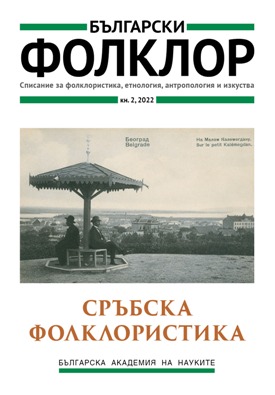Мемоаристика и „друг фолклор“
Memoir Corpus and “Other Folklore”
Author(s): Nemanja RadulovićSubject(s): Politics, History, Anthropology, Social Sciences, Language and Literature Studies, Cultural history, Customs / Folklore, Library and Information Science, Classification, Studies of Literature, Sociology, History of ideas, Oral history, Political history, Social history, Modern Age, Recent History (1900 till today), Serbian Literature, Cultural Anthropology / Ethnology, Culture and social structure , Social development, Social differentiation, Social Informatics, Sociology of Culture, 18th Century, 19th Century, Interwar Period (1920 - 1939), WW II and following years (1940 - 1949), Post-War period (1950 - 1989), Philology, Social Norms / Social Control, Politics of History/Memory, Politics and Identity, Identity of Collectives, Peace and Conflict Studies, Sociology of Literature
Published by: Институт за етнология и фолклористика с Етнографски музей при БАН
Keywords: “other folklore”; folklore of small groups (criminals and prisoners; students; seminarists); urban folklore; political folklore
Summary/Abstract: Phenomena defined in contemporary folkloristics as postfolklore, small groups folklore, urban folklore have for long been out of the focus of Serbian folkloristics, and papers on this topic have only recently started appearing. Quite understandably, the studies are directed towards contemporary material. However, the diachronic aspect of these phenomena exists too. The testimonies of the existence of such forms of folklore in the past can be found in memoir and diary literature, as well as in the corpus of historical (not folkloristic) archives. All these past phenomena are covered here with the umbrella term “other folklore” whose function is descriptive, not theoretical. Everything that folkloristic paradigms in the past failed to see as a “real” folklore (equated with oral, rural, and traditional) – making that material invisible and hidden in the sources less used by folklorists – is classified here as “other.” “Other folklore” in this case encompasses a few kinds of folklore: folklore of small groups (criminals and prisoners, students, seminarists) and urban folklore (mostly connected to Belgrade). Political folklore could belong here too. It is often close to traditional genres in its forms, but historical and political conditions have made it unsuitable and evicted it to the out-of-sight memory of memoirs and diaries (such are, say, monarchist songs from World War II, or political jokes from the time of Communism). Political folklore sometimes coincides with other “otherness” categories, say, the parodic urban folklore from the time of the Nazi occupation of Belgrade that is an example both of political and urban creativity; humoristic and unheroic, it did not fit the folklore of resistance ideal even upon the end of the war. Such a corpus approach makes it possible to see the diachronic background of many contemporary examples and discover new sources of folklore in the less examined material. More importantly, the definitions of folklore themselves are tested by this approach (surely, along the lines of Popper’s criticism of “facts,” it is definitely not a “discovery,” but a re-evaluation of concepts before approaching the corpus). Finally, such analyses can be useful to historians too, because they reveal the hidden side of certain epochs and their mind-sets, as well as the genre conditionality of historical sources.
Journal: Български фолклор
- Issue Year: XLVIII/2022
- Issue No: 2
- Page Range: 209-228
- Page Count: 20
- Language: Bulgarian
- Content File-PDF

